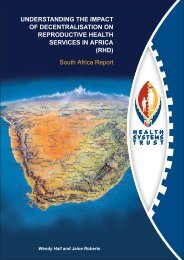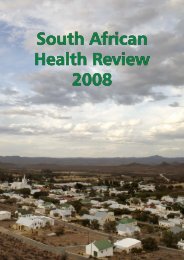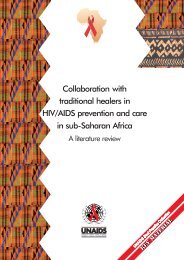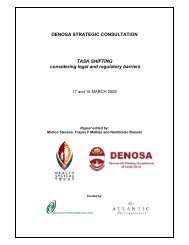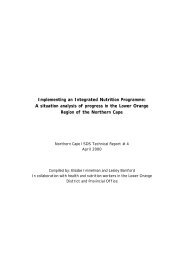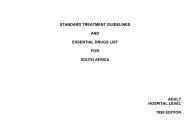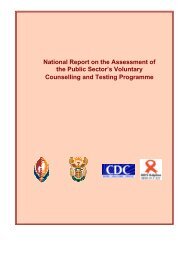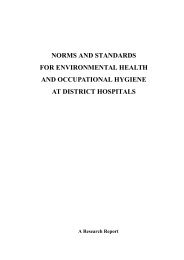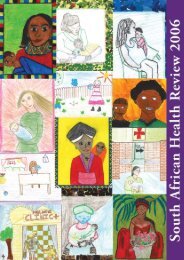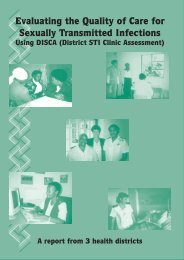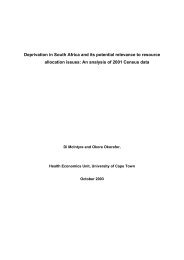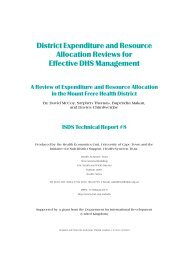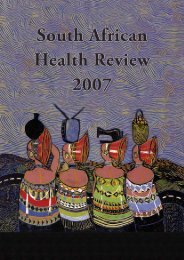PMTCT, and National's - Health Systems Trust
PMTCT, and National's - Health Systems Trust
PMTCT, and National's - Health Systems Trust
Create successful ePaper yourself
Turn your PDF publications into a flip-book with our unique Google optimized e-Paper software.
6.4 Maternal <strong>and</strong> Infant Follow Up<br />
INTEGRATING HIV CARE INTO PRIMARY HEALTH CARE<br />
The national <strong>PMTCT</strong> protocol stipulates that care must extend beyond the point of delivery for<br />
both mother <strong>and</strong> child. All women are advised to return for a post-natal care visit within 3-<br />
14 days after discharge, every two weeks in the first month <strong>and</strong> once a month thereafter. The<br />
purpose of these visits is to assess the woman for signs of infection, to provide multivitamins<br />
<strong>and</strong> prophylaxis against opportunistic infections, to provide support for exclusive breastfeeding<br />
if this is the chosen feeding method <strong>and</strong> to provide guidance on safe formula feeding <strong>and</strong><br />
formula milk supplies to women who have selected to formula feed. These recommendations<br />
for maternal care are based on the DoH Guidelines for Maternity Care in South Africa.<br />
The recommendations for follow up of infants in <strong>PMTCT</strong> pilot sites are based on the South<br />
African DoH IMCI clinical case management guidelines, which were adapted in 2001/2 to<br />
include care of children infected or affected by HIV/AIDS. This suggests that infants should<br />
be followed up weekly during the first month of life, <strong>and</strong> monthly thereafter, until the age of<br />
twelve months. The purpose of these visits is for growth monitoring, assessment of feeding<br />
difficulties, provision of prophylaxis against opportunistic infections, assessment for clinical<br />
signs suggestive of AIDS, routine immunizations according to the South African EPI schedule,<br />
<strong>and</strong> HIV testing.<br />
Despite the presence of comprehensive guidelines for follow up care, this evaluation found<br />
that very few of the sites are able to provide the appropriate postnatal care required for<br />
women with HIV <strong>and</strong> their families. The challenges to providing follow up care are numerous,<br />
<strong>and</strong> include:<br />
• Difficulties identifying HIV positive women <strong>and</strong> their infants at clinics due to inadequate<br />
tracking mechanisms.<br />
• Many women opting not to disclose their status to clinic staff.<br />
• Poor access to health facilities due to long distances <strong>and</strong> a lack of affordable transport<br />
All facilities were able to provide routine MCWH services, however, additional follow-up care<br />
such as co-trimoxazole prophylaxis, infant testing, support groups, multivitamins, <strong>and</strong> AIDS<br />
care were more difficult, <strong>and</strong> very few facilities are at a stage where they have integrated<br />
these components into primary health care services.<br />
Provinces that have achieved success in following mothers <strong>and</strong> infants, namely the Western<br />
Cape <strong>and</strong> KwaZulu-Natal, have implemented an expansion plan that targets geographical<br />
areas <strong>and</strong> referral systems rather than sites <strong>and</strong> facilities. This enables a hospital <strong>and</strong> its<br />
surrounding feeder clinics to implement <strong>PMTCT</strong> before the service is extended to other hospitals.<br />
This strategy strengthens referral networks within sub-districts to allow for continuity of care<br />
between delivery centers <strong>and</strong> clinics.<br />
Both of these provinces have hired dedicated <strong>PMTCT</strong> staff to assist existing staff with the<br />
additional dem<strong>and</strong>s of this service. In the Paarl site in the Western Cape, the co-ordinator<br />
sends a list to the clinics each month notifying them of the infants due for HIV testing. If these<br />
infants do not attend the clinic during the expected month, a home visit is conducted to trace<br />
these infants. In KwaZulu-Natal the use of community health workers to improve the follow<br />
up of infants is being explored. These are both strategies that are human resource intensive<br />
however; the benefits in terms of monitoring the effectiveness of the programme <strong>and</strong> improved<br />
clinical management of mothers <strong>and</strong> infants may outweigh the costs.<br />
This evaluation found that women who had opted for formula feeding received more frequent<br />
postpartum care than women who chose to breastfeed because they attend health facilities<br />
more frequently to receive formula supplies. However, women opting for breastfeeding seem<br />
to only attend clinics for infant immunizations; they are not routinely followed up for infant<br />
feeding care <strong>and</strong> support <strong>and</strong> to maintain breast health. A key factor hampering follow up<br />
efforts is the reluctance of many <strong>PMTCT</strong> clients to disclose their status to health workers. In<br />
many areas the facility in which initial antenatal HIV testing occurs (frequently a community<br />
health centre), is different from the facility in which well child-care occurs (mostly a clinic<br />
setting). Women may have established a trusting relationship with their lay counsellor in the<br />
antenatal setting <strong>and</strong> may not want to risk disclosing their status to a new group of health<br />
workers in a different setting.<br />
34



